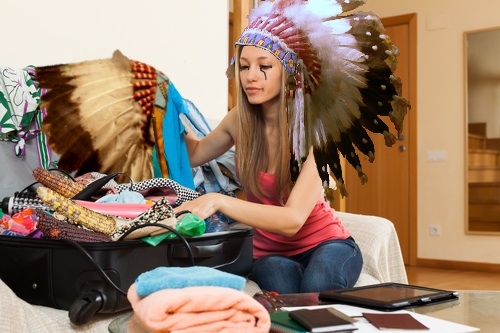


TORONTO — After the news that Aboriginal headdresses will not be allowed at Montreal music festival Osheaga, Toronto party girl Becky Cotter has been protesting the ban citing her family’s longstanding tradition of appropriating other cultures.
Cotter was at home solemnly unpacking a suitcase of twelve Indigenous headdresses she had packed for Osheaga weekend.
“My ancestors went to music festivals dressed in headpieces and fringed vests just like these,” Cotter complained, referring to her hippy-dippy, equally white parents. “It is part of my culture. It is my right,” she said. “Plus I look so cute in it.”
Cotter explained that the headpiece she was holding at the time belonged to her father, who wore it on Halloween in 1974 when he dressed up as a “cigar store Indian.”
“The Cotters have a proud tradition of appropriating other cultures. For example, my mom is famous for her Asian-inspired interior design,” Cotter argued, gesturing to a brightly painted Buddha from Pier 1 that sat on her shelf.
“And my little brother is following in our footsteps,” said Cotter. “Just last week he got dreadlocks!”
“I just don’t get it. It’s so unfair,” said a pouting Cotter as she removed headdress after headdress from the suitcase. “What did we ever do to them?”, she asked, referring to a community of people who the federal government tried to forcibly assimilate with a wanton disregard for their desires or safety.
“I mean, I know some government people tried to, like, totally erase Aboriginal culture in the past, or something, but now we’re celebrating it — by putting it on shirts and purses and stuff and selling it!”, said Cotter.
A single tear rolled down the proud East end-dweller’s cheek as she placed a “fringed feather headpiece” (purchased at Urban Outfitters for $175) on her bedroom floor. “It’s just not fair,” she sighed.
At press time, Cotter was refilling her bag with stick-on crystal bindis and henna powder.


